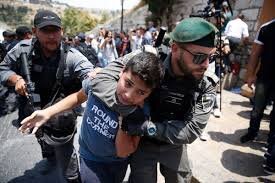Hawzah News Agency (Occupied Palestine) - A leading independent organization for children says Palestinian children detained by Israeli military forces are exposed to systematic torture and various forms of abuse, and the practices have apparently been legitimized by the Tel Aviv regime’s judiciary.
Save the Children said in a new report that there are currently at least 200 Palestinian children behind bars at Ofer, Damon and Megiddo detention centers, and the detainees include children with disabilities and mental health problems.
The report added that Damon and Megiddo prisons are heavily congested, and child prisoners are kept there in close proximity to each other in squalid and unsanitary conditions.
Save the Children noted that children in custody are mistreated in an “appalling” matter and they “are being harmed.”
The reality is that if animals were treated like this, it would be a domestic and even international scandal, the NGO pointed out.
The organization’s findings demonstrate that female prisoners are also subjected to horrifying treatment. Interviews with former detainees reveal that girls reported being detained more frequently at checkpoints, whereas a majority of boys were arrested at their homes. Young Palestinians are regularly targeted near Israeli settlements in the occupied West Bank.
While most of the punishments were carried out within the Israeli prisons, the report also pointed to the fact that abuse usually starts before any investigations, during which those arrested are humiliated and tortured even more.
According to testimonies collected by Save the Children, children said they were blindfolded and handcuffed, and were subjected to physical and verbal abuse during their arrest and transportation. Furthermore, many were arrested at night and deprived of sleep before being interrogated.
The NGO also highlighted that those left without lasting physical damage are often scarred psychologically.
Almost half of the children interviewed agreed that they are failing to return fully to normal life. Eighty-five percent said they have changed due to their experiences and the impact of their detention is felt most when they try to get back to normal life with their families.
Former child detainees report an inability to trust anyone and build meaningful relationships in “post-detention life”. In fact, they display poor social skills and tend to isolate themselves from the outside world because of their insecurities and fear of “the others.”
Save the Children then called on the Palestinian Authority to facilitate the reintegration of former detainees in their communities and in the education system.
The NGO also urged the Ramallah-based administration to support an awareness-raising program and integrate it within the school curriculum to help children understand their rights at every stage of the detention process, including their right to silence, legal assistance and education.
The most common charge against imprisoned Palestinian children is stone-throwing, which the Israeli military considers to be a “security offence”. Those found guilty can get up to 20 years in prison, depending on the child’s age.


Your Comment